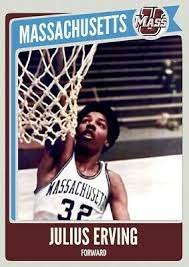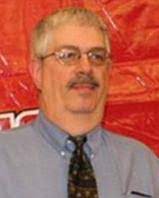Few basketball players have had a better year than Julius Erving did in 1976: Slam Dunk contest champ, scoring champ, all-defensive 1st-team, all-ABA 1st-team, All-Star, league MVP, Playoffs MVP, and league champ. Not too shabby for a guy who only played 2 years of college basketball, although it was a heck of a 2 years. After enrolling at UMass in 1968 he averaged 26.3 PPG/20.2 RPG in 2 years on the varsity while becoming 1 of only 6 players to average 20 & 20 during their college careers. He turned pro in 1971, had a Hall of Fame career in the ABA/NBA, and later fulfilled a promise to his mother by earning a bachelor’s degree in creative leadership and administration. HoopsHD’s Jon Teitel got to chat with UMass alum Al Beaubien about his memories of the man known simply as “Dr. J”. Today marks the 45th anniversary of Erving winning the ABA title with the New York Nets and being named Playoffs MVP on May 13, 1976.
Erving was nicknamed “Dr. J”: who gave him the nickname, and how did he like it? He was never really known by that nickname in college: it sort of evolved after he got to the pros. I know that a good friend of his gave it to him.
In 2 varsity seasons at UMass he averaged 26.3 PPG/20.2 RPG: how did he balance his scoring with his rebounding? He had a great ability to jump/rebound and could score both inside/outside. He worked hard at his game: he did not just show up and play. He played on an undefeated freshman team, the 1st in school history: he did not average a ton of AST but was a good passer. We did not keep stats on BLK back then but he definitely had multiple BLK every single game. Coach Jack Leaman was drooling to get Julius and Al Skinner on the court at the same time…but it did not happen until Julius attended Al’s retirement ceremony! He played against Syracuse on his 21st birthday and had 1 of the greatest performances that I have ever seen: 36 PTS/32 REB/7 AST! Our gym only held about 4000 but there must have been around 6000 people crowded in there that evening. The crowd sang “Happy Birthday” to him before the game and he did not flinch 1 bit: I was sitting in my usual seat behind the basket.
He left college early to pursue a pro career and scored 27.3 PPG as a rookie with Virginia while leading the ABA in offensive REB: how was he able to make such a smooth transition from college to the pros? He was just a good player. Some people probably thought that he was not that good because he went to UMass but he stepped up his game against the best opponents we played. He fouled out of his final game against North Carolina in the NIT. The coach was looking forward to picking out a game during his senior year where he would let Julius loose to just score as many PTS as he could.
He won the 1976 ABA Slam Dunk Contest with a dunk from the FT line (www.youtube.com/watch?v=tNTgdcBDqJ4) and is considered by many to be the greatest dunker of all time: how crucial was his athleticism to his success? His hands were absolutely huge: the only player I ever saw with bigger hands was Connie Hawkins. It was easy for him to palm the ball and he was so graceful. When he went up in the air and someone tried to get under him, he could just adjust in mid-air and go right around them. I heard stories from his sophomore year that the team could dunk during the pregame as long as the refs were not out there watching. There were guys who would mill around the hallway and then signal the team when the refs were close to coming out! He put on a heck of a show: even dunking 2 balls at the same time.
Off the court he became 1 of the first basketball players to endorse products, had a shoe marketed under his name, and even starred in the 1979 film “The Fish That Saved Pittsburgh” (www.youtube.com/watch?v=sv5W7XRhvfY): did it reach a point where he was simply 1 of the most popular athletes in the country? I do not know about that. There were still some great around like Wilt Chamberlain/Bill Russell and by the end of the career Larry Bird/Magic Johnson/Michael Jordan had arrived.
In the 1980 NBA Finals with the 76ers he executed the legendary “Baseline Move” where he made a reverse layup from behind the backboard to avoid getting his shot blocked by Kareem Abdul-Jabbar (www.youtube.com/watch?v=TQ2apIiatlg): did people realize at the time how incredible a move it was? It was an amazing shot! That was before ESPN became popular but it still got replayed a ton of times: even my grandsons have seen it and go “wow!” The other 1 that I remember was the dunk over the Lakers (www.youtube.com/watch?v=SrlBgLdGKZM).
He won 3 scoring titles and his 30,026 PTS in that ABA/NBA combined remains in the top-10 all-time: what was his secret for being such a great scorer? I know that 30,000 PTS was quite important to him: he mentions that specifically in his autobiography. He was not a great shooter and there was no 3-PT line at the time but he could always score. He worked hard to make himself what he was.
He is 1 of the few players in the modern basketball era to have his number retired by 2 different franchises (Nets and 76ers): these days you see plenty of future Hall of Famers switching teams (Kevin Durant/LeBron James/Chris Paul/etc.) but how big a deal was it back in 1976 when Erving switched teams? The only real switch was from the Nets. It was sad in a way because he started with Virginia but they sold him to the Nets before they went belly-up. When he joined Philly it was another deal where the ABA was going to fold. It was so different back then with no free agency but did not seem like that big a deal: now it is totally different.
In 1993 he was inducted into the Basketball Hall of Fame and in 1996 he was named to the NBA’s 50th Anniversary All-Time team: where do these accomplishments rank among the highlights of his career? When I 1st saw him play on campus he was a great player and a class act. He worked hard and played at the highest level and was honored as 1 of the greats.
He won 3 championships/4 MVP awards: do you think that his lasting legacy will be as a winner or a great player or a combination of both? I think that he is a combination. When he went to the 76ers he had some tough times at 1st: not on a personal level but simply adjusting to putting the right crew on the floor. I was happy when he finally won a title with Philly even though he had already won a pair of ABA titles. He led the league in scoring/rebounding as well.




